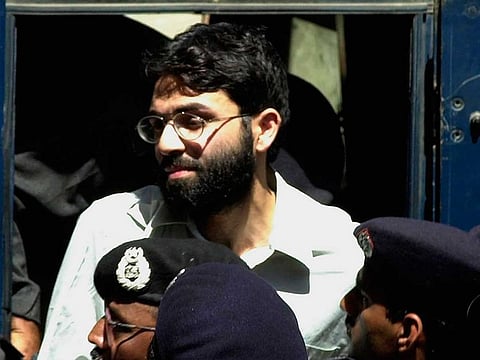Pakistan court frees man convicted of beheading US journalist Daniel Pearl
Ahmed Omar Sheikh acquitted by panel of three judges, Pearl’s family in ‘complete shock’

Karachi: Pakistan’s Supreme Court on Thursday ordered the release of an Islamist convicted of beheading US journalist Daniel Pearl, a decision that has left his family in “complete shock”, lawyers said.
Ahmed Omar Saeed Sheikh, who was the main suspect in the 2002 kidnapping and murder of Wall Street Journal reporter Pearl, was acquitted by a panel of three judges.
“By a majority of two to one, they have acquitted all the accused persons and ordered their release,” a provincial advocate general, Salman Talibuddin, told Reuters.
Pearl, 38, was investigating Islamist militants in Karachi after the Sept. 11, 2001, attacks on the United States when he was kidnapped. His case grabbed headlines globally after a video of his beheading emerged weeks after he was abducted.
Sheikh and his co-accused are to be released immediately if they aren’t required in any other case, the head of the court panel, Justice Mushir Alam, said in a short court order.
A high court last year commuted the death penalty of the British-born Sheikh into a life sentence and acquitted his three co-accused, citing lack of evidence.
The government and Pearl’s parents challenged that decision and pleaded to the Supreme Court to reinstate the death penalty.
The Supreme Court turned down both pleas on Thursday.
The United States had said that it may seek to try Sheikh if efforts to keep him in prison failed.
The Pearl family was in “complete shock”, the family’s lawyer, Faisal Siddiqi, told Reuters, adding that the court decision was a travesty of justice.
“No amount of injustice will defeat our resolve to fight for justice for Daniel Pearl,” he said.
Omar Sheikh: from private schoolboy to militant kidnapper
Islamabad: Ahmed Omar Saeed Sheikh, the militant who spent over 18 years behind bars for masterminding the abduction of slain US reporter Daniel Pearl, traded privilege and scholarship for a life of jihad, kidnappings, and ultimately a prison cell.
Born in London in 1973 to a prosperous Pakistani garment merchant, Omar was given the best education, including enrolment at a private primary school in London, a stint at Lahore's prestigious Aitchison College, and a brief tenure at the London School of Economics (LSE).
He abandoned his comfortable Western upbringing after just a year at LSE, reportedly travelling to Bosnia during the brutal Balkans war in the early 1990s, where his jihadist zeal sprouted after coming into contact with Pakistani militants.
The former boxer and arm wrestling enthusiast is believed to have returned to Pakistan to spend several months in a militant training camp, and travelled to Kashmir to fight Indian forces.
In India he carried out his first kidnapping, abducting an American and three British tourists in 1994.
Indian police captured him in a shootout, initially thinking he was one of the British hostages because of his clipped accent and Western bearing.
He was jailed in New Delhi, but never charged.
In prison he met Pakistani militant Maulana Masood Azhar, who went on to found the hardline Kashmir militant group Jaish-e-Mohammed.
New Delhi freed both Azhar and Omar in 1999 when the hijackers of an Indian Airlines plane demanded his release in exchange for their hostages.
Omar returned to Lahore to live with his family, marrying in November 2000.
Pearl killing
Omar came into contact with Pearl, the Wall Street Journal's South Asia bureau chief, when he was delving into the murky underworld of Pakistani militant groups after the September 11 attacks and in the wake of the US invasion of Afghanistan.
The two exchanged several emails, according to police, as Pearl sought introductions to militant leaders.
In their correspondence Omar presented himself as a warm, family-oriented man - all part of a ploy to lure Pearl to a trap that ultimately led to his abduction during a reporting trip in Karachi in January 2002.
Omar was arrested in February 2002 while Pearl was still missing, and boasted to a Karachi court that the journalist was already dead.
A week later, a graphic video depicting Pearl's gruesome decapitation was delivered to the US consulate in Karachi.
Omar remained defiant even after being sentenced to death for his role in the kidnapping.
"We shall see who will die first, either I or the authorities who have arranged the death sentence for me," he said in a message read out by his lawyer.
However in January 2011, a report released by the Pearl Project at Georgetown University following an investigation into his death made chilling revelations, claiming that the wrong men were convicted for Pearl's murder.
The investigation, led by Pearl's friend and former Wall Street Journal colleague Asra Nomani and a Georgetown University professor, claimed the reporter was murdered by Khalid Sheikh Mohammed, the alleged mastermind of the September 11 attacks, not Sheikh.
Mohammed, who is currently in the US military prison in Guantanamo Bay, confessed to killing Pearl, according to American officials in 2007.
Defence lawyers for Sheikh had his murder conviction and death sentence overturned in early 2020, and that was upheld by the country's Supreme Court Thursday, paving the way for his release along with three other accomplices.
- Reuters
Sign up for the Daily Briefing
Get the latest news and updates straight to your inbox







